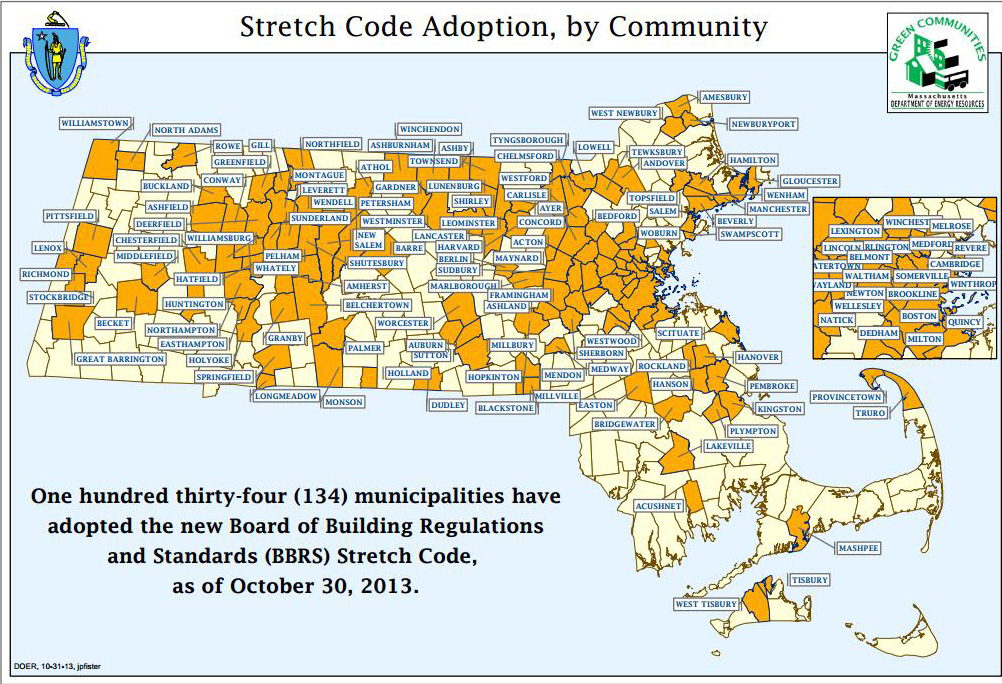Unless Massachusetts communities push to update the state’s Stretch Code before July 1, 2014, the 20% boost in building energy efficiency it provides will evaporate, creating market confusion and violate the very concept behind its inception.
What is the Massachusetts Stretch Code?
Written in 2009, the Massachusetts
Stretch Energy Code (Appendix AA) is a voluntary supplement to the energy code designed to help cities and towns claim incentives offered by the
Green Communities Act. The Stretch Code is approximately 20 percent more energy efficient than the state’s current base code, the 2009 International Energy Conservation Code (2009 IECC), yielding annual energy savings of over $500 per home.
[MORE]
Why update the Stretch Code?
The need to update the Massachusetts Stretch Code arose with the state’s
adoption of a new base code, the 2012 IECC, this past July. The 2012 IECC, like the Stretch Code, is about 20 percent more energy efficient than the 2009 IECC (in fact, the 2012 IECC borrows some language directly from the Stretch Code). As such,
when the 2012 IECC goes into full effect on July 1, 2014, the Stretch Code would be essentially equivalent to the base code. Since the Green Communities Act requires participants to adopt an advanced building energy code, the Stretch Code communities could technically be held responsible for developing and legislating their own stretch codes, creating much confusion at both municipal and state levels.
There is mixed news regarding the Stretch Code update process:
Bad news: Instead of pursuing a written draft, the Mass. Department of Energy Resources (DOER) has opened a public comment period on the general topics that should be covered by the next version of the Stretch Code. Moreover, DOER has not set a deadline for these comments and has, by all indications, put the Stretch Code update on the political back burner.
Good news: This provides an opportunity for communities that have adopted or are considering adopting the Stretch Code to voice their support for prioritizing the update. Only 15 stakeholders have responded thus far, so a wave of comments would make a significant impact.
What can I do?
Stretch code stakeholders can submit their comments to
stretchcode@state.ma.us. DOER asks that comments be organized into three sections—Core Concepts, Suggested Improvements, and New Suggestions—as explained in their
webinar.
NEEP has submitted our comments to DOER, which has started posting the comments it has received on its Green Communities page.
NEEP has also developed a
comment template, which includes NEEP’s key messages:
- The State should move in expeditious manner in developing the new Stretch Code. There is a very real concern that when the 2012 IECC goes into full effect on July 1, 2014, the Stretch Code will be essentially equivalent to the base code. This would violate the very concept of a stretch code, create market confusion, and eliminate its utility to the Stretch Code communities.
- The State should use this opportunity to align the Stretch Code with the newly-finalized 2015 IECC (and ASHRAE 90.1-2013). Since the state will be mandated (by the Green Communities Act) to adopt the 2015 IECC within a year of its publication this spring, writing a new Stretch Code that is incompatible with the 2015 IECC would necessitate another update as soon as next year.
To learn more about the Massachusetts stretch code or adopting a stretch code in your state, check out NEEP’s
Model Progressive Building Energy Codes Policy or contact
Kevin Rose.
 If the title and picture seem completely bizarre to you, I’d highly recommend watching Dr. Strangelove after you finish reading this post. It’s a classic.
If the title and picture seem completely bizarre to you, I’d highly recommend watching Dr. Strangelove after you finish reading this post. It’s a classic. To date, 134 municipalities have adopted the Stretch Code as their mandatory energy code.
To date, 134 municipalities have adopted the Stretch Code as their mandatory energy code.